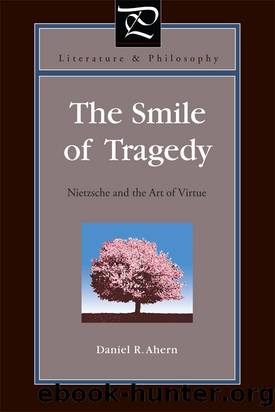The Smile of Tragedy by Ahern Daniel R

Author:Ahern, Daniel R. [Ahern]
Language: eng
Format: epub
ISBN: 9780271052502
Publisher: Pennsylvania State University Press
Published: 2012-03-12T16:00:00+00:00
Narcissus Philosophizes
For Nietzsche, with this “basic error of [the] philosophers … the Greek world perishes” because now “everything genuinely Hellenic is made responsible for the state of decay.”77 The foremost of these philosophers after Socrates is, of course, Plato, who, having “read something refined and noble into the proposition of his teacher” (B 190), provides the best “example of the most complete severance of the instincts from the past. He is profound, passionate in everything anti-Hellenic.”78 Nietzsche suggests that with Plato, the “decline of Greece is understood as an objection to the foundations of Hellenic culture.”79 Now the master morality typical of the old nobility is rejected as false because it was inseparable from the very desires that haunted and threatened the Socratics. And for this reason, Nietzsche believed, the “moralism of the Greek philosophers from Plato onwards is pathologically conditioned: likewise their estimation of dialectics” (T II 10). Among these thinkers, virtue is by no means manifest in deeds risking suffering and death, but becomes more and more confined to the “deed” of philosophy, which, as dialectics, is the means to “the consciousness of exercising mastery over oneself.”80 These philosophers constitute “the counter-movement against the old, the noble taste” and had “more than enough reason to let morality be preached to them” (T II 3).
The great campaign against the body and desire as barriers to virtue was initiated in an age wherein “anxiety concerning oneself becomes the soul of philosophy.”81 Philosophy, then, is the new realm of virtue. The very exercise of reason as dialectics was seen as identical with virtue, which, insofar as it negated the “monstrum in animo” (T II 9), generated what Nietzsche called a “detestable pretension to happiness.”82 The ethical gesture is no longer motivated by an intoxicated risk of oneself, but by the more “philosophical” one of preserving oneself within a perceived state of siege. This self-preservative activity is pursued through charting out the territory of the “self,” which becomes more and more manifest within philosophical reflection. Prior to Socrates, the value of individuals depended on how quickly they would dispose of their lives for the sake of something other than themselves—their family, class, or city. But in the “Socratic schools” (T X 3) decadence “betrays itself,” Nietzsche says, in a “preoccupation with ‘happiness’ … with ‘salvation of the soul.’”83 Ultimately, the Socratic virtues are “conceptual” entities that, “by definition,” are sterilized from all corporeal infection. Indeed, the very process of philosophizing constitutes virtue because it severs the “self” from the body, thereby illuminating our rational identity. From Nietzsche's point of view, this moralizing “self-examination” marks the beginning of a valorization of the individual, which, in determining the course of Western intellectual history, is the object of his everlasting scorn.
He saw Socratic thought as an attempt to bring about moral reform in order to salvage a culture sliding into decline. But, since this rescue is done in the name of “philosophy,” the process of decay is actually promoted. With the Socratic shift toward “subjectivity”
Download
This site does not store any files on its server. We only index and link to content provided by other sites. Please contact the content providers to delete copyright contents if any and email us, we'll remove relevant links or contents immediately.
| African | Asian |
| Australian & Oceanian | Canadian |
| Caribbean & Latin American | European |
| Jewish | Middle Eastern |
| Russian | United States |
4 3 2 1: A Novel by Paul Auster(11045)
The handmaid's tale by Margaret Atwood(6851)
Giovanni's Room by James Baldwin(5877)
Big Magic: Creative Living Beyond Fear by Elizabeth Gilbert(4723)
Asking the Right Questions: A Guide to Critical Thinking by M. Neil Browne & Stuart M. Keeley(4573)
On Writing A Memoir of the Craft by Stephen King(4213)
Ego Is the Enemy by Ryan Holiday(3991)
Ken Follett - World without end by Ken Follett(3972)
The Body: A Guide for Occupants by Bill Bryson(3797)
Bluets by Maggie Nelson(3708)
Adulting by Kelly Williams Brown(3668)
Guilty Pleasures by Laurell K Hamilton(3585)
Eat That Frog! by Brian Tracy(3512)
White Noise - A Novel by Don DeLillo(3434)
The Poetry of Pablo Neruda by Pablo Neruda(3366)
Alive: The Story of the Andes Survivors by Piers Paul Read(3309)
The Bookshop by Penelope Fitzgerald(3225)
The Book of Joy by Dalai Lama(3217)
Fingerprints of the Gods by Graham Hancock(3211)
